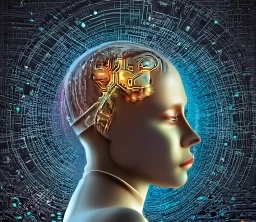In the realm of technology, few fields evoke as much fascination and excitement as Artificial Intelligence (AI). From self-driving cars to voice-activated virtual assistants, AI is transforming the way we live, work, and interact with the world around us. However, for many, AI remains shrouded in mystery, perceived as an esoteric domain accessible only to experts and academics.
In this beginner’s guide, we unravel the complexities of AI and explore its fundamental concepts, applications, and implications for society.
What is Artificial Intelligence?
At its core, Artificial Intelligence refers to the development of computer systems capable of performing tasks that typically require human intelligence. These tasks encompass a broad spectrum, ranging from understanding natural language and recognizing patterns in data to making decisions and learning from experience.
Key Concepts in AI:
- Machine Learning (ML):
Machine learning is a subset of AI focused on enabling machines to learn from data without being explicitly programmed. Through algorithms and statistical models, machines can identify patterns, make predictions, and improve performance over time.
2. Deep Learning:
Deep learning is a subset of machine learning that employs artificial neural networks with multiple layers to process and analyze complex data. Inspired by the structure of the human brain, deep learning algorithms excel in tasks such as image recognition, natural language processing, and speech synthesis.
3. Neural Networks:
Neural networks are computational models composed of interconnected nodes, or neurons, organized into layers. Each neuron receives input, processes it through activation functions, and generates output. Neural networks are the building blocks of deep learning systems.
4. Supervised Learning:
In supervised learning, algorithms are trained on labeled data, where each input is associated with a corresponding output. The goal is to learn a mapping from inputs to outputs, enabling the algorithm to make predictions on new, unseen data.
5. Unsupervised Learning:
Unsupervised learning involves training algorithms on unlabeled data to uncover hidden patterns or structures within the data. Clustering, dimensionality reduction, and anomaly detection are common tasks in unsupervised learning.
6. Reinforcement Learning:
Reinforcement learning is a paradigm where agents learn to make decisions by interacting with an environment and receiving feedback in the form of rewards or penalties. Through trial and error, agents learn optimal strategies to maximize cumulative rewards.
Applications of AI:
- Natural Language Processing (NLP):
NLP enables machines to understand, interpret, and generate human language. Applications include language translation, sentiment analysis, and chatbots.
2. Computer Vision:
Computer vision focuses on enabling machines to interpret and analyze visual information from the environment. Applications include image recognition, object detection, and autonomous vehicles.
3. Recommendation Systems:
Recommendation systems use AI algorithms to analyze user preferences and behavior and provide personalized recommendations. Examples include movie recommendations on streaming platforms and product recommendations on e-commerce websites.
4. Healthcare:
AI is revolutionizing healthcare through applications such as medical imaging analysis, predictive analytics for disease diagnosis, and personalized treatment planning.
5. Finance:
In the finance sector, AI is used for fraud detection, algorithmic trading, risk assessment, and customer service automation.
Ethical Considerations:
As AI continues to advance, ethical considerations surrounding its development and deployment become increasingly important. Key issues include bias in algorithms, privacy concerns, job displacement, and the potential for misuse or abuse of AI technologies.
Artificial Intelligence holds immense promise for transforming industries, solving complex problems, and improving human lives. By understanding the fundamental concepts and applications of AI, individuals can appreciate its potential and contribute to shaping a future where intelligent machines coexist harmoniously with humanity, guided by ethical principles and responsible stewardship.
In this fast-paced era of technological innovation, AI fundamentals serve as a gateway to unlocking new possibilities and charting a course towards a more intelligent and interconnected world. As we embark on this journey, let curiosity be our compass and learning our guiding light in navigating the ever-expanding frontier of Artificial Intelligence.









